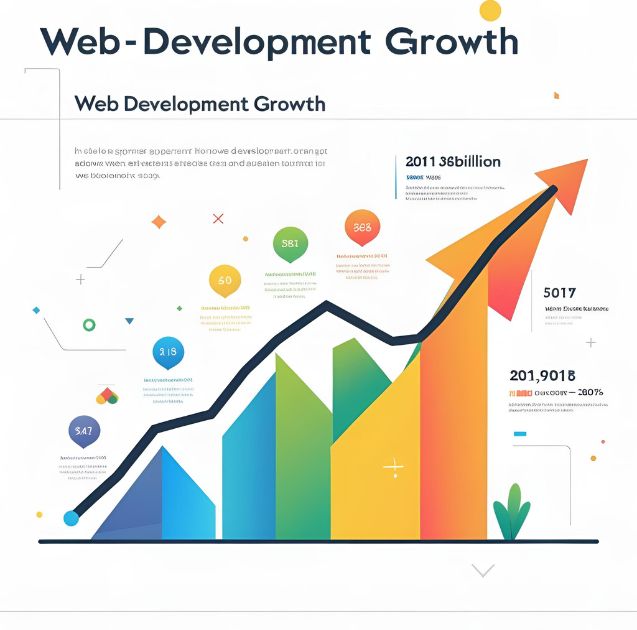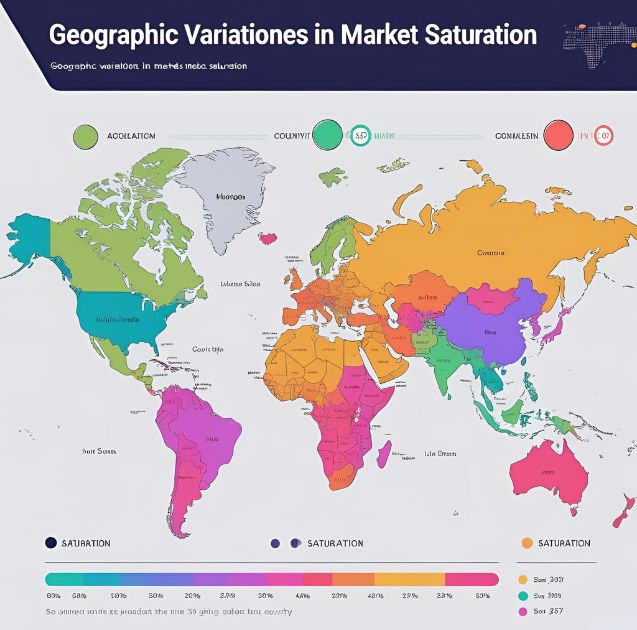The web development industry has exploded over the past decade. Coding bootcamps promise six-figure salaries after just months of training. Social media influencers showcase their remote developer lifestyles from exotic locations. Everyone seems to be learning to code.
But beneath the glossy surface, many aspiring developers face a harsh reality: rejection after rejection, overcrowded job markets, and intense competition for entry-level positions. This has sparked an important question that’s rippling through developer communities worldwide: Is web development truly saturated?
The answer isn’t black and white. While certain segments of the web development market show signs of oversaturation, others present abundant opportunities for skilled developers. Understanding where the market stands—and where it’s heading—can help you make informed decisions about your career path.
The Numbers Behind Web Development Growth

Web development has experienced unprecedented growth since 2010. The Bureau of Labor Statistics projects that employment for web developers will grow 8% from 2019 to 2029, much faster than the average for all occupations. This translates to approximately 13,400 new jobs during that period.
Several factors drive this demand:
Digital transformation acceleration: Companies across industries are digitizing their operations, creating massive demand for web applications, e-commerce platforms, and digital tools.
Remote work normalization: The shift to remote work has increased reliance on web-based collaboration tools, cloud applications, and digital infrastructure.
E-commerce boom: Online shopping continues to grow, requiring sophisticated web platforms and custom solutions.
Mobile-first approach: Businesses need responsive web applications that work seamlessly across devices.
Despite these positive indicators, the supply side tells a different story. Coding bootcamps graduated over 23,000 students in 2015 alone. Computer science enrollment has surged at universities worldwide. Online learning platforms like freeCodeCamp, Codecademy, and The Odin Project have created millions of self-taught developers.
Where Saturation Actually Exists
Not all web development roles face equal competition. The saturation problem primarily affects specific segments of the market.
Entry-Level Frontend Positions
Junior frontend developer roles experience the most intense competition. These positions typically require knowledge of HTML, CSS, and JavaScript—skills that bootcamps and online courses teach effectively in short timeframes.
The barrier to entry is relatively low. You can build a portfolio website, complete some tutorials, and apply for junior positions within months. This accessibility attracts thousands of career changers, recent graduates, and self-taught developers to the same job pool.
Many companies receive hundreds of applications for single entry-level frontend positions. Hiring managers report difficulty distinguishing between candidates with similar portfolios and skill levels.
Basic WordPress Development
WordPress powers over 40% of all websites, making it an attractive entry point for new developers. However, this popularity has created oversaturation in basic WordPress development services.
Freelance marketplaces overflow with developers offering WordPress site creation for extremely low rates. Many clients can’t differentiate between quality custom development and basic theme customization, leading to a race to the bottom on pricing.
Simple Website Creation
The market for basic business websites faces pressure from both oversupply and technological disruption. DIY website builders like Wix, Squarespace, and Webflow enable non-technical users to create professional-looking sites without hiring developers.
Simultaneously, thousands of developers offer basic website creation services, creating intense price competition for simple projects.
High-Demand Areas with Growth Potential
While certain areas show saturation, other web development specialties face talent shortages and offer excellent career prospects.
Full-Stack Development
Companies increasingly seek developers who can work across the entire web development stack. Full-stack developers understand both frontend and backend technologies, making them valuable for smaller teams and startup environments.
The complexity of modern web applications requires developers who can integrate multiple technologies, APIs, and services. This skill combination is harder to acquire quickly, creating more opportunities for experienced developers.
Backend Development and API Design
Backend development remains in high demand as applications become more complex and data-driven. Skills in Node.js, Python, Java, and database management command strong salaries and job security.
API development has become crucial as companies build microservices architectures and integrate multiple systems. Developers who understand API design, security, and performance optimization are highly sought after.
JavaScript Frameworks and Libraries
React, Vue.js, and Angular continue to dominate modern web development. Companies need developers who can build complex single-page applications and understand state management, component architecture, and modern JavaScript features.
These frameworks evolve rapidly, requiring continuous learning and adaptation. Developers who stay current with framework updates and best practices maintain competitive advantages.
Cloud and DevOps Integration
Modern web development increasingly involves cloud platforms, containerization, and continuous integration/deployment (CI/CD) pipelines. Developers with AWS, Google Cloud, or Azure experience command premium salaries.
Understanding Docker, Kubernetes, and deployment automation separates skilled developers from those who only know basic coding. These skills are harder to acquire but offer significant career advancement opportunities.
E-commerce and Fintech
Specialized domains like e-commerce and financial technology require developers with a deep understanding of complex business logic, security requirements, and regulatory compliance.
E-commerce platforms need developers who understand payment processing, inventory management, and performance optimization for high-traffic sites. Fintech applications require expertise in security, data encryption, and financial regulations.
Geographic Variations in Market Saturation

Web development market conditions vary significantly by location and local economic factors.
Major Tech Hubs
Cities like San Francisco, New York, Seattle, and Austin have intense competition for web development positions. The high concentration of tech companies attracts developers from around the world, creating oversupply in some skill areas.
However, these markets also offer the highest salaries and most innovative projects. Senior developers and specialists can still find excellent opportunities despite the competition.
Emerging Tech Markets
Cities like Denver, Nashville, Raleigh, and Portland have growing tech scenes with less competition than traditional hubs. Companies in these markets often struggle to find qualified developers, creating opportunities for both junior and senior professionals.
Cost of living in these markets is typically lower than major tech hubs, but salaries remain competitive, offering a better quality of life for many developers.
Remote Work Opportunities
The remote work revolution has fundamentally changed web development hiring. Companies now access global talent pools, but developers also compete with professionals worldwide.
This globalization creates both opportunities and challenges. Skilled developers can work for companies in high-paying markets while living in lower-cost areas. However, they also face competition from developers in countries with lower salary expectations.
Skills That Combat Market Saturation
Certain technical and soft skills help developers stand out in competitive markets.
Technical Specializations
Performance optimization: Developers who understand web performance, Core Web Vitals, and optimization techniques are highly valued as companies prioritize user experience.
Security expertise: Web security knowledge becomes increasingly important as cyber threats evolve. Developers who understand OWASP guidelines, secure coding practices, and vulnerability assessment are in demand.
Accessibility: Creating inclusive web experiences requires specialized knowledge of WCAG guidelines and assistive technologies. Few developers have deep accessibility expertise.
Testing and quality assurance: Developers who understand automated testing, test-driven development, and quality assurance processes are valuable team members.
Soft Skills and Business Acumen
Problem-solving abilities: Companies value developers who can understand business requirements and translate them into technical solutions.
Communication skills: Developers who can explain technical concepts to non-technical stakeholders and collaborate effectively with designers and product managers stand out.
Project management: Understanding agile methodologies, project planning, and team coordination makes developers more valuable to employers.
Industry knowledge: Developers who understand specific industries (healthcare, finance, education) can command premium rates for specialized projects.
The Future of Web Development Demand
Several trends will shape web development opportunities over the next decade.
Emerging Technologies
Progressive Web Apps (PWAs): The line between web and mobile applications continues to blur. Developers who understand PWA development will find growing opportunities.
WebAssembly: As WebAssembly matures, developers who can work with languages like Rust and C++ for web development will have unique advantages.
AI and Machine Learning Integration: Web applications increasingly incorporate AI features. Developers who understand how to integrate machine learning models into web applications will be highly sought after.
Continued Digital Transformation
Many industries are still early in their digital transformation journeys. Healthcare, education, government, and traditional manufacturing sectors need web developers who understand their unique challenges and requirements.
Small and medium-sized businesses continue to recognize the importance of digital presence, creating ongoing demand for web development services.
Strategies for Success in a Competitive Market
Developers can take specific steps to succeed despite market saturation in certain areas.
Continuous Learning and Adaptation
The web development landscape evolves rapidly. Developers who commit to continuous learning and stay current with new technologies maintain competitive advantages.
Focus on understanding fundamental concepts rather than just learning specific frameworks. Strong foundations in computer science, algorithms, and software architecture enable adaptation to new technologies.
Building a Strong Portfolio
Quality portfolio projects demonstrate skills more effectively than certifications or degrees. Focus on building projects that showcase problem-solving abilities, technical skills, and attention to detail.
Contribute to open-source projects to demonstrate collaboration skills and technical expertise. Many employers value open-source contributions as evidence of passion and skill.
Networking and Community Involvement
Building professional relationships within the developer community opens doors to opportunities that aren’t publicly advertised. Attend meetups, conferences, and online communities relevant to your interests.
Mentoring junior developers and sharing knowledge through blog posts or talks establishes you as a thought leader and creates valuable connections.
Specialization Strategy
Rather than trying to be a generalist, consider specializing in specific technologies, industries, or problem domains. Deep expertise in niche areas often commands higher rates and faces less competition.
Making Informed Career Decisions
Web development isn’t universally saturated, but the market has become more competitive and nuanced. Success requires strategic thinking about skills, specialization, and career positioning.
Entry-level positions face the most competition, but opportunities exist for developers who demonstrate strong fundamentals, continuous learning, and problem-solving abilities. The key is understanding where demand exists and aligning your skills accordingly.
Rather than asking whether web development is saturated, ask where your interests and abilities can create the most value. The most successful developers find niches where their skills meet market needs, regardless of overall market conditions.
The web development field continues to evolve and expand. While the path to success may be more challenging than it was a decade ago, opportunities remain abundant for skilled, adaptable developers who understand both technology and business needs.







